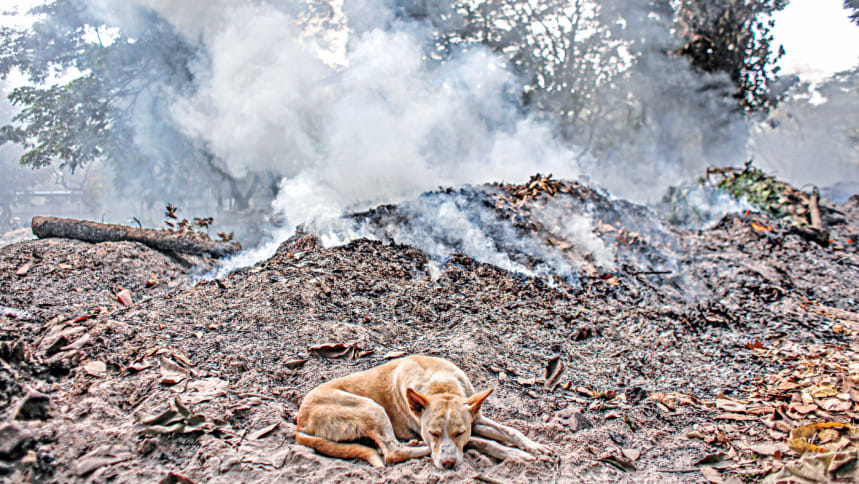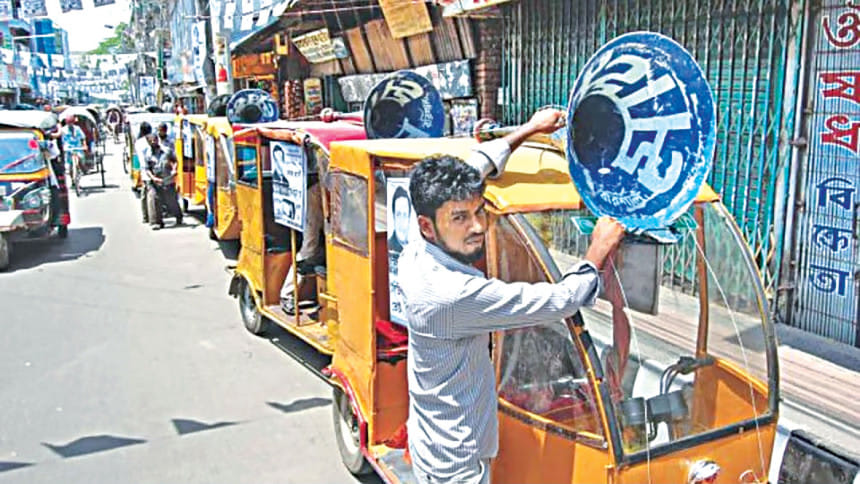Gulshan noisiest, Shahbagh air most polluted

The state of Dhaka's environment when it comes to air quality and noise level has been found to be way below standard, as Gulshan-2 is the noisiest neighbourhood, while Shahbagh's air is the most polluted.
Besides, Buriganga river, used to be known as the lifeline of Dhaka, saw a marginal improvement in water quality during the monsoon of 2022. It remained severely polluted the rest of the year.
The data was revealed in a validation workshop titled "State of Dhaka's Environment Report", organised by Waterkeepers Bangladesh at Dhaka Reporters Unity yesterday.
Three studies were done separately by the Centre for Atmospheric Pollution Studies (CAPS) of Stamford University's Department of Environmental Science (two studies) and Jahangirnagar University's Department of Geography and Environment (one study). The data were recorded in 2022.
In one study, the annual average particulate matter (PM 2.5) in Shahbagh was found to be 91.4 micrograms per cubic metre, six times higher than the standard, 15 micrograms per cubic metre.

The least polluted spot, the parliament area, witnessed 59.4 micrograms per cubic metre, four times higher than the safe level.
Motijheel, the commercial hub, comes in second, with a PM 2.5 concentration of 79.4 micrograms per cubic metre. Industrial zone Tejgaon grabbed the third spot, with 67.0.
Apart from these, Ahsan Manjil ranked fourth (70.6), Gulshan-2 fifth (71.2), Mirpur-10 sixth (72.7), Dhanmondi-32 (73.6) seventh, and Agargaon eighth (74.8). The annual average air quality of the ten areas is 73.1 micrograms per cubic metre.
In terms of PM 10 concentration, Mirpur-10 saw the highest pollution, 48.8 micrograms per cubic metre, while lowest was recorded at the parliament area (37.2).
The air quality varies from season to season, the study observed.
Prof Ahmad Kamruzzaman Majumder, founding chairman CAPS, told The Daily Star that construction work at Shahbagh, along with waste burning at Ramna Park and near Shahbagh police station, led to it ranking top.
"The air quality of Dhaka sees an improvement on Friday, as vehicular movement declines. It sees a sharp rise on Thursday, when city dwellers go for vacations in large numbers," he said.
Meanwhile, Gulshan-2 is the noisiest out of 10 areas in the capital selected for one of the studies.
The annual average noise level there is 95.4 decibels, while Tejgaon is the quietest (89 decibels). The allowable level for residential areas is 55 decibels, as per the national standard set by Department of Environment.
Abdullapur, a mixed area (residential and commercial), recorded 95.4, making it the second-most polluted. For a mixed area, the permissible limit is 60 decibels.

The noise level at Ahsan Manjil and Mirpur-10 is 95 decibels, making them the third noisiest areas in the capital.
Motijheel witnessed 93.6 decibels, while in the parliament area, categorised as a silent area, the noise level is 93.5 decibels. So, they are the fourth and fifth noisiest places, the study summed up.
The standard level for silent areas is 50 decibels.
As per the study, the noise level in Shahbagh is 92.8 decibels, 92.7 in Dhanmondi-32, and 91.3 in Agargaon.
The state of Buriganga did not change much, as pollution continues to worsen its condition, found the study of JU.
The water quality was found below standard. Although during monsoon, the quality improves a bit, but that too remains below the expected level.
Muzibur Rahman Howlader, former chairman of National River Conservation Commission and chief guest of the workshop, said even without a study the deteriorating water quality of Buriganga can be inferred.
One can smell the river's foul odour even while standing far from the waterbody, he said, adding that there is no river in the country as abysmal as Buriganga.
"When I was chairman and used to visit rivers and submit reports of the poor conditions of our important waterbodies, the ministry seemed to be irked. I later found out that even the ministers grabbed rivers and built two industries," he added.
He said there are laws to protect rivers and the environment in general, but the department of environment does not do what is required.
Sharif Jamil, general secretary of Bangladesh Poribesh Andolon, moderated the workshop.

 For all latest news, follow The Daily Star's Google News channel.
For all latest news, follow The Daily Star's Google News channel. 



Comments